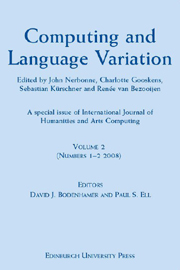Book contents
- Frontmatter
- Contents
- From the Editors
- Notes on Contributors
- 1 Introduction: Language Variation Studies and Computational Humanities
- 2 Panel Discussion on Computing and the Humanities
- 3 Making Sense of Strange Sounds: (Mutual) Intelligibility of Related Language Varieties. A Review
- 4 Phonetic and Lexical Predictors of Intelligibility
- 5 Linguistic Determinants of the Intelligibility of Swedish Words among Danes
- 6 Mutual Intelligibility of Standard and Regional Dutch Language Varieties
- 7 The Dutch-German Border: Relating Linguistic, Geographic and Social Distances
- 8 The Space of Tuscan Dialectal Variation: A Correlation Study
- 9 Recognising Groups among Dialects
- 10 Comparison of Component Models in Analysing the Distribution of Dialectal Features
- 11 Factor Analysis of Vowel Pronunciation in Swedish Dialects
- 12 Representing Tone in Levenshtein Distance
- 13 The Role of Concept Characteristics in Lexical Dialectometry
- 14 What Role does Dialect Knowledge Play in the Perception of Linguistic Distances?
- 15 Quantifying Dialect Similarity by Comparison of the Lexical Distribution of Phonemes
- 16 Corpus-based Dialectometry: Aggregate Morphosyntactic Variability in British English Dialects
1 - Introduction: Language Variation Studies and Computational Humanities
Published online by Cambridge University Press: 12 September 2012
- Frontmatter
- Contents
- From the Editors
- Notes on Contributors
- 1 Introduction: Language Variation Studies and Computational Humanities
- 2 Panel Discussion on Computing and the Humanities
- 3 Making Sense of Strange Sounds: (Mutual) Intelligibility of Related Language Varieties. A Review
- 4 Phonetic and Lexical Predictors of Intelligibility
- 5 Linguistic Determinants of the Intelligibility of Swedish Words among Danes
- 6 Mutual Intelligibility of Standard and Regional Dutch Language Varieties
- 7 The Dutch-German Border: Relating Linguistic, Geographic and Social Distances
- 8 The Space of Tuscan Dialectal Variation: A Correlation Study
- 9 Recognising Groups among Dialects
- 10 Comparison of Component Models in Analysing the Distribution of Dialectal Features
- 11 Factor Analysis of Vowel Pronunciation in Swedish Dialects
- 12 Representing Tone in Levenshtein Distance
- 13 The Role of Concept Characteristics in Lexical Dialectometry
- 14 What Role does Dialect Knowledge Play in the Perception of Linguistic Distances?
- 15 Quantifying Dialect Similarity by Comparison of the Lexical Distribution of Phonemes
- 16 Corpus-based Dialectometry: Aggregate Morphosyntactic Variability in British English Dialects
Summary
The volume we are introducing here contains a selection of the papers presented at a special track on computational techniques for studying language variation held at The Thirteenth International Conference on Methods in Dialectology in Leeds on 4–5 August 2008. We are grateful to the conference organisers, Nigel Armstrong, Joan Beal, Fiona Douglas, Barry Heselwood, Susan Lacey, Ann Thompson, and Clive Upton for their cooperation in our organisation of the event. We likewise owe thanks to the referees of the present volume, who we are pleased to acknowledge explicitly: Agnes de Bie, Roberto Bolognesi, David Britain, Cynthia Clopper, Ken Decker, Anders Eriksson, Hans Goebl, Stefan Grondelaers, Carlos Gussenhoven, Nynke de Haas, Frans Hinskens, Angela Kluge, Gitte Kristiansen, Alexandra Lenz, Maarten Mous, Hermann Niebaum, Lisa Lena Opas-Hänninen, Petya Osenova, John Paolillo, Louis Pols, Helge Sandøy, Bob Shackleton, Felix Schaeffler, Marco Spruit, Rint Sybesma, Nathan Vaillette, Gunther de Vogelaer, and Esteve Valls.
The conference track consisted of 24 papers and posters, including a keynote address by Vincent van Heuven on phonetic techniques for studying variation and comprehensibility. Fourteen contributions were selected for publication in this special issue of the International Journal for Humanities and Arts Computing, including van Heuven's. In addition the conference track featured a panel session reflecting on the introduction of computational techniques to the study of language variation and more generally, on computing and the humanities. We have prepared a report on the panel session for publication here as well.
- Type
- Chapter
- Information
- Computing and Language VariationInternational Journal of Humanities and Arts Computing Volume 2, pp. 1 - 18Publisher: Edinburgh University PressPrint publication year: 2009



